Health and Social Care: Placement Portfolio and Reflection Report
VerifiedAdded on 2023/01/19
|12
|3260
|32
Report
AI Summary
This report presents a student's portfolio reflecting on a 24-hour health and social care placement. The assignment begins by defining reasoning capability and its importance in decision-making within a healthcare setting, emphasizing critical thinking as a vital tool for nurses dealing with ethical dilemmas. The student utilizes the Gibbs reflective cycle to analyze their placement experience, detailing the environment, feelings, evaluations, and actions. The report further examines the student's personal values, including religious beliefs, compassion, dignity, and friendliness, and their impact on professional conduct. Principles such as communication, equality, and respect are also discussed. The portfolio concludes with an action plan to improve future practice, focusing on reinforcing classroom knowledge, maintaining confidence, and aligning personal and professional values. The report demonstrates an understanding of professional, moral, and ethical issues in health and social care, addressing critical moments and applying reflective models.
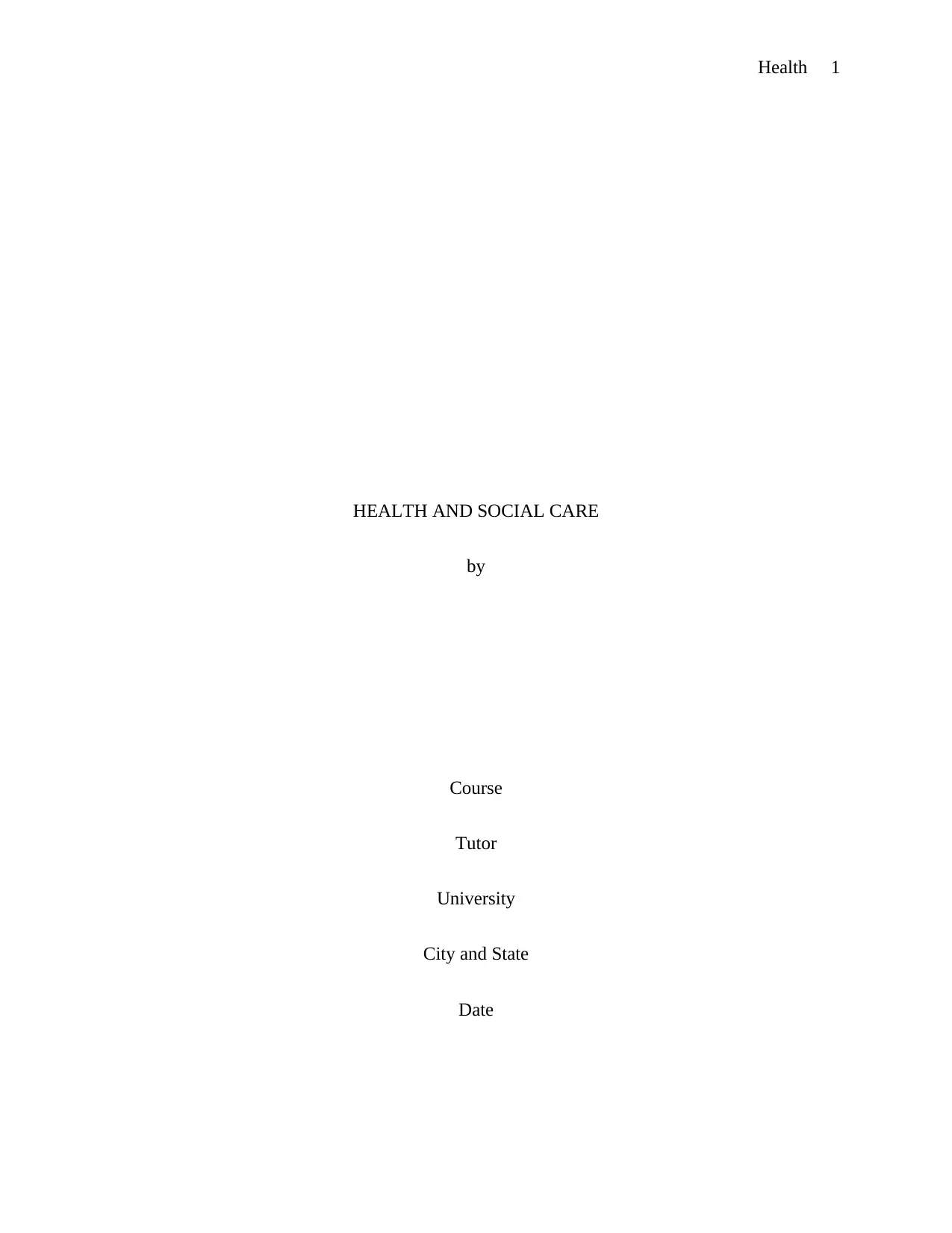
Health 1
HEALTH AND SOCIAL CARE
by
Course
Tutor
University
City and State
Date
HEALTH AND SOCIAL CARE
by
Course
Tutor
University
City and State
Date
Paraphrase This Document
Need a fresh take? Get an instant paraphrase of this document with our AI Paraphraser
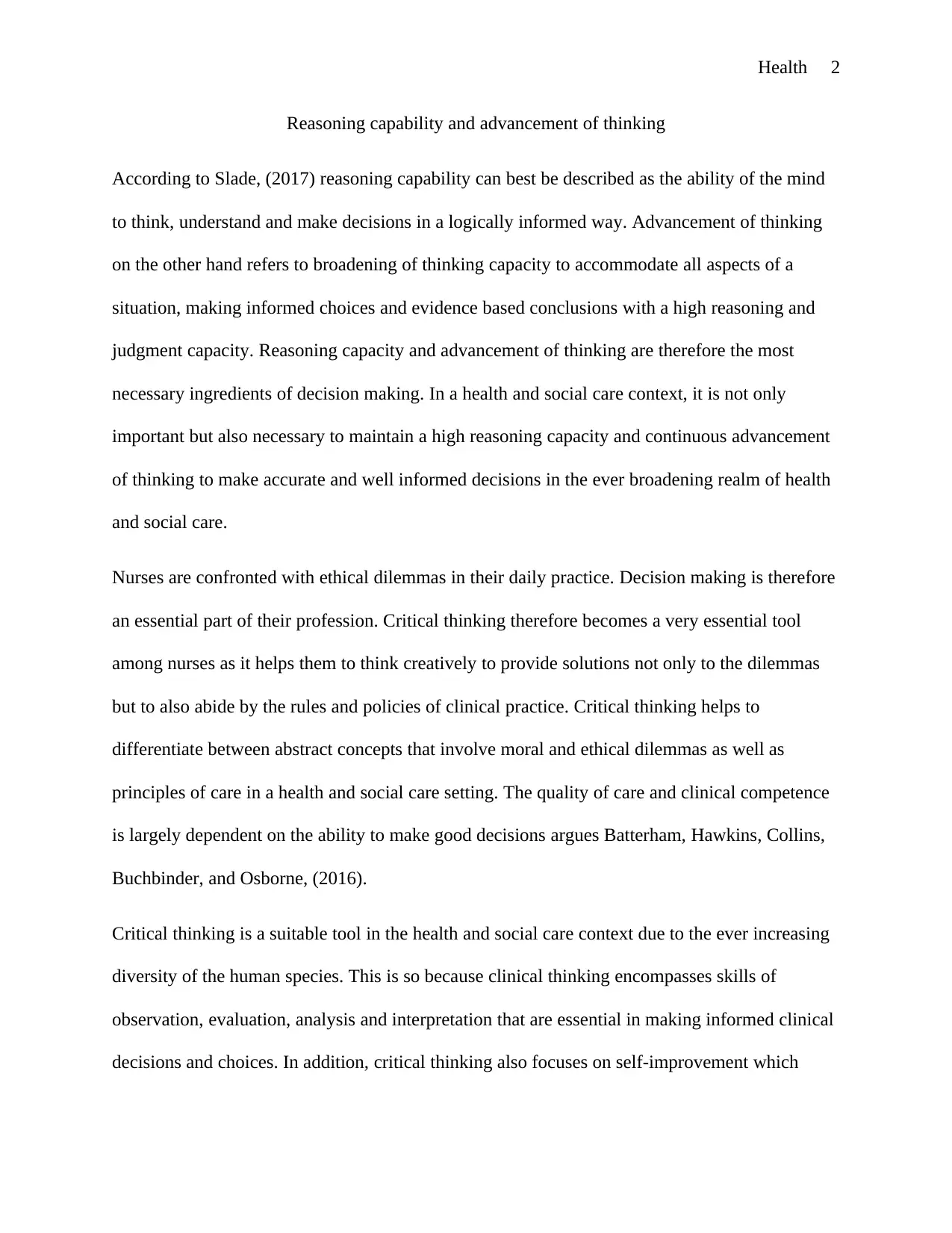
Health 2
Reasoning capability and advancement of thinking
According to Slade, (2017) reasoning capability can best be described as the ability of the mind
to think, understand and make decisions in a logically informed way. Advancement of thinking
on the other hand refers to broadening of thinking capacity to accommodate all aspects of a
situation, making informed choices and evidence based conclusions with a high reasoning and
judgment capacity. Reasoning capacity and advancement of thinking are therefore the most
necessary ingredients of decision making. In a health and social care context, it is not only
important but also necessary to maintain a high reasoning capacity and continuous advancement
of thinking to make accurate and well informed decisions in the ever broadening realm of health
and social care.
Nurses are confronted with ethical dilemmas in their daily practice. Decision making is therefore
an essential part of their profession. Critical thinking therefore becomes a very essential tool
among nurses as it helps them to think creatively to provide solutions not only to the dilemmas
but to also abide by the rules and policies of clinical practice. Critical thinking helps to
differentiate between abstract concepts that involve moral and ethical dilemmas as well as
principles of care in a health and social care setting. The quality of care and clinical competence
is largely dependent on the ability to make good decisions argues Batterham, Hawkins, Collins,
Buchbinder, and Osborne, (2016).
Critical thinking is a suitable tool in the health and social care context due to the ever increasing
diversity of the human species. This is so because clinical thinking encompasses skills of
observation, evaluation, analysis and interpretation that are essential in making informed clinical
decisions and choices. In addition, critical thinking also focuses on self-improvement which
Reasoning capability and advancement of thinking
According to Slade, (2017) reasoning capability can best be described as the ability of the mind
to think, understand and make decisions in a logically informed way. Advancement of thinking
on the other hand refers to broadening of thinking capacity to accommodate all aspects of a
situation, making informed choices and evidence based conclusions with a high reasoning and
judgment capacity. Reasoning capacity and advancement of thinking are therefore the most
necessary ingredients of decision making. In a health and social care context, it is not only
important but also necessary to maintain a high reasoning capacity and continuous advancement
of thinking to make accurate and well informed decisions in the ever broadening realm of health
and social care.
Nurses are confronted with ethical dilemmas in their daily practice. Decision making is therefore
an essential part of their profession. Critical thinking therefore becomes a very essential tool
among nurses as it helps them to think creatively to provide solutions not only to the dilemmas
but to also abide by the rules and policies of clinical practice. Critical thinking helps to
differentiate between abstract concepts that involve moral and ethical dilemmas as well as
principles of care in a health and social care setting. The quality of care and clinical competence
is largely dependent on the ability to make good decisions argues Batterham, Hawkins, Collins,
Buchbinder, and Osborne, (2016).
Critical thinking is a suitable tool in the health and social care context due to the ever increasing
diversity of the human species. This is so because clinical thinking encompasses skills of
observation, evaluation, analysis and interpretation that are essential in making informed clinical
decisions and choices. In addition, critical thinking also focuses on self-improvement which
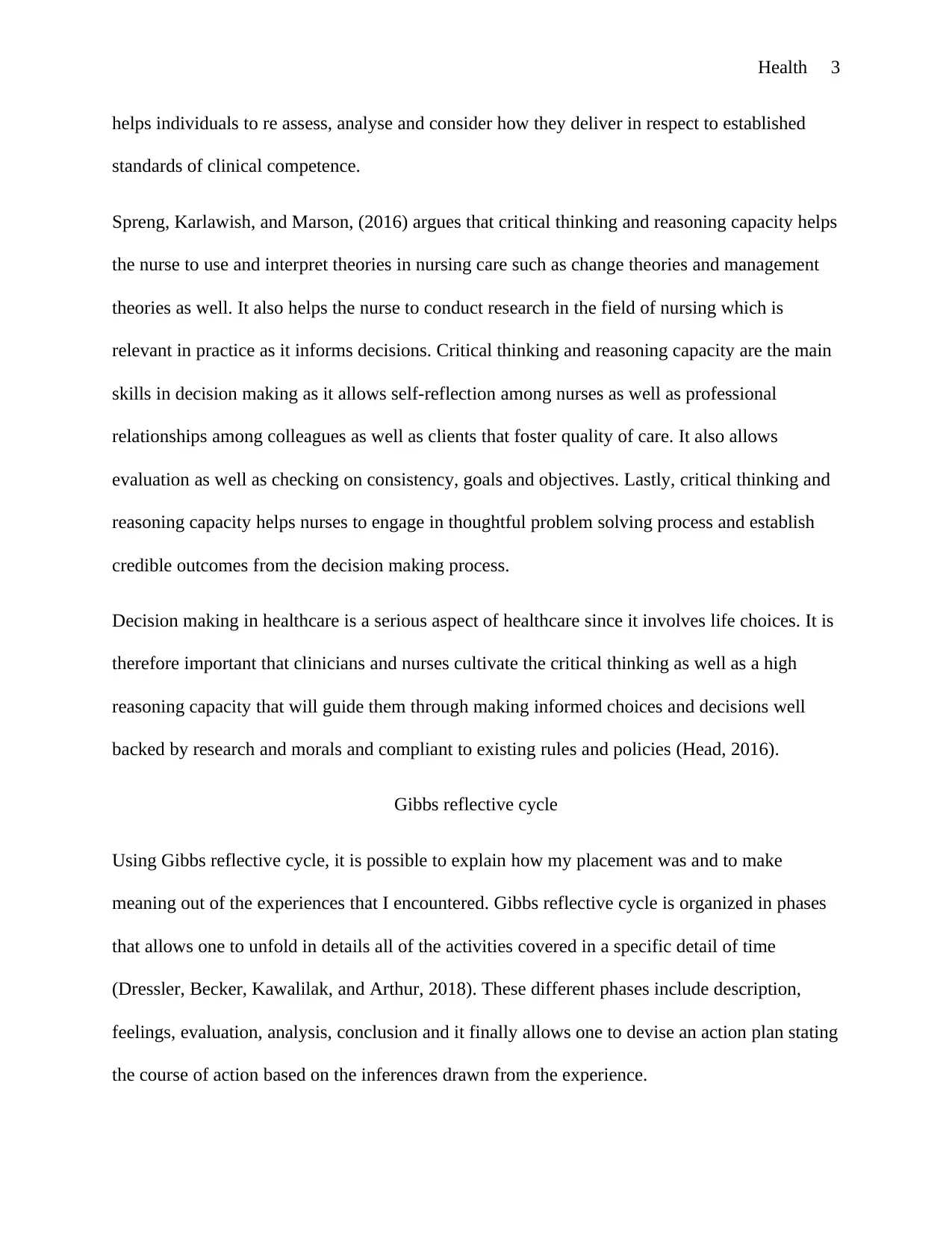
Health 3
helps individuals to re assess, analyse and consider how they deliver in respect to established
standards of clinical competence.
Spreng, Karlawish, and Marson, (2016) argues that critical thinking and reasoning capacity helps
the nurse to use and interpret theories in nursing care such as change theories and management
theories as well. It also helps the nurse to conduct research in the field of nursing which is
relevant in practice as it informs decisions. Critical thinking and reasoning capacity are the main
skills in decision making as it allows self-reflection among nurses as well as professional
relationships among colleagues as well as clients that foster quality of care. It also allows
evaluation as well as checking on consistency, goals and objectives. Lastly, critical thinking and
reasoning capacity helps nurses to engage in thoughtful problem solving process and establish
credible outcomes from the decision making process.
Decision making in healthcare is a serious aspect of healthcare since it involves life choices. It is
therefore important that clinicians and nurses cultivate the critical thinking as well as a high
reasoning capacity that will guide them through making informed choices and decisions well
backed by research and morals and compliant to existing rules and policies (Head, 2016).
Gibbs reflective cycle
Using Gibbs reflective cycle, it is possible to explain how my placement was and to make
meaning out of the experiences that I encountered. Gibbs reflective cycle is organized in phases
that allows one to unfold in details all of the activities covered in a specific detail of time
(Dressler, Becker, Kawalilak, and Arthur, 2018). These different phases include description,
feelings, evaluation, analysis, conclusion and it finally allows one to devise an action plan stating
the course of action based on the inferences drawn from the experience.
helps individuals to re assess, analyse and consider how they deliver in respect to established
standards of clinical competence.
Spreng, Karlawish, and Marson, (2016) argues that critical thinking and reasoning capacity helps
the nurse to use and interpret theories in nursing care such as change theories and management
theories as well. It also helps the nurse to conduct research in the field of nursing which is
relevant in practice as it informs decisions. Critical thinking and reasoning capacity are the main
skills in decision making as it allows self-reflection among nurses as well as professional
relationships among colleagues as well as clients that foster quality of care. It also allows
evaluation as well as checking on consistency, goals and objectives. Lastly, critical thinking and
reasoning capacity helps nurses to engage in thoughtful problem solving process and establish
credible outcomes from the decision making process.
Decision making in healthcare is a serious aspect of healthcare since it involves life choices. It is
therefore important that clinicians and nurses cultivate the critical thinking as well as a high
reasoning capacity that will guide them through making informed choices and decisions well
backed by research and morals and compliant to existing rules and policies (Head, 2016).
Gibbs reflective cycle
Using Gibbs reflective cycle, it is possible to explain how my placement was and to make
meaning out of the experiences that I encountered. Gibbs reflective cycle is organized in phases
that allows one to unfold in details all of the activities covered in a specific detail of time
(Dressler, Becker, Kawalilak, and Arthur, 2018). These different phases include description,
feelings, evaluation, analysis, conclusion and it finally allows one to devise an action plan stating
the course of action based on the inferences drawn from the experience.
⊘ This is a preview!⊘
Do you want full access?
Subscribe today to unlock all pages.

Trusted by 1+ million students worldwide
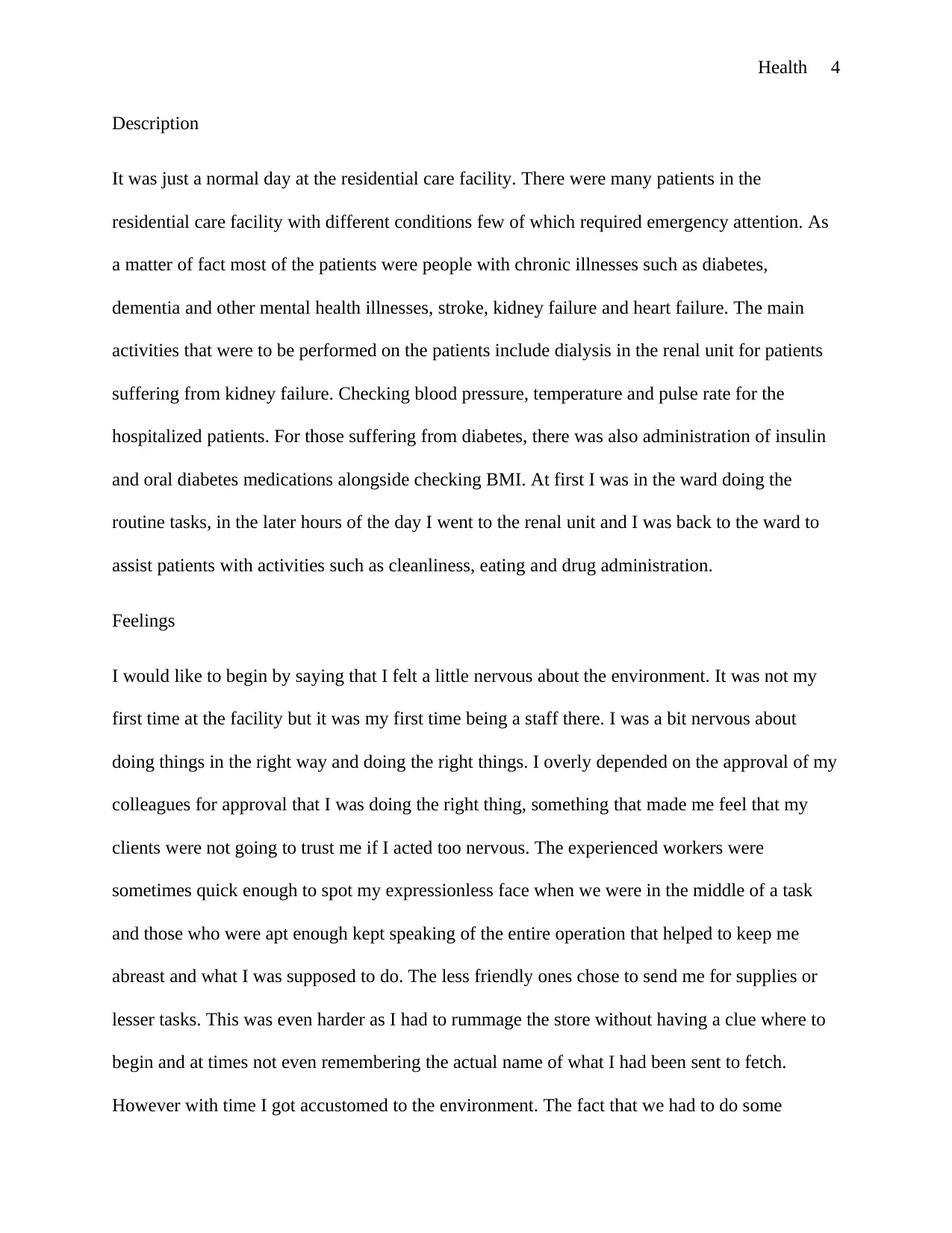
Health 4
Description
It was just a normal day at the residential care facility. There were many patients in the
residential care facility with different conditions few of which required emergency attention. As
a matter of fact most of the patients were people with chronic illnesses such as diabetes,
dementia and other mental health illnesses, stroke, kidney failure and heart failure. The main
activities that were to be performed on the patients include dialysis in the renal unit for patients
suffering from kidney failure. Checking blood pressure, temperature and pulse rate for the
hospitalized patients. For those suffering from diabetes, there was also administration of insulin
and oral diabetes medications alongside checking BMI. At first I was in the ward doing the
routine tasks, in the later hours of the day I went to the renal unit and I was back to the ward to
assist patients with activities such as cleanliness, eating and drug administration.
Feelings
I would like to begin by saying that I felt a little nervous about the environment. It was not my
first time at the facility but it was my first time being a staff there. I was a bit nervous about
doing things in the right way and doing the right things. I overly depended on the approval of my
colleagues for approval that I was doing the right thing, something that made me feel that my
clients were not going to trust me if I acted too nervous. The experienced workers were
sometimes quick enough to spot my expressionless face when we were in the middle of a task
and those who were apt enough kept speaking of the entire operation that helped to keep me
abreast and what I was supposed to do. The less friendly ones chose to send me for supplies or
lesser tasks. This was even harder as I had to rummage the store without having a clue where to
begin and at times not even remembering the actual name of what I had been sent to fetch.
However with time I got accustomed to the environment. The fact that we had to do some
Description
It was just a normal day at the residential care facility. There were many patients in the
residential care facility with different conditions few of which required emergency attention. As
a matter of fact most of the patients were people with chronic illnesses such as diabetes,
dementia and other mental health illnesses, stroke, kidney failure and heart failure. The main
activities that were to be performed on the patients include dialysis in the renal unit for patients
suffering from kidney failure. Checking blood pressure, temperature and pulse rate for the
hospitalized patients. For those suffering from diabetes, there was also administration of insulin
and oral diabetes medications alongside checking BMI. At first I was in the ward doing the
routine tasks, in the later hours of the day I went to the renal unit and I was back to the ward to
assist patients with activities such as cleanliness, eating and drug administration.
Feelings
I would like to begin by saying that I felt a little nervous about the environment. It was not my
first time at the facility but it was my first time being a staff there. I was a bit nervous about
doing things in the right way and doing the right things. I overly depended on the approval of my
colleagues for approval that I was doing the right thing, something that made me feel that my
clients were not going to trust me if I acted too nervous. The experienced workers were
sometimes quick enough to spot my expressionless face when we were in the middle of a task
and those who were apt enough kept speaking of the entire operation that helped to keep me
abreast and what I was supposed to do. The less friendly ones chose to send me for supplies or
lesser tasks. This was even harder as I had to rummage the store without having a clue where to
begin and at times not even remembering the actual name of what I had been sent to fetch.
However with time I got accustomed to the environment. The fact that we had to do some
Paraphrase This Document
Need a fresh take? Get an instant paraphrase of this document with our AI Paraphraser
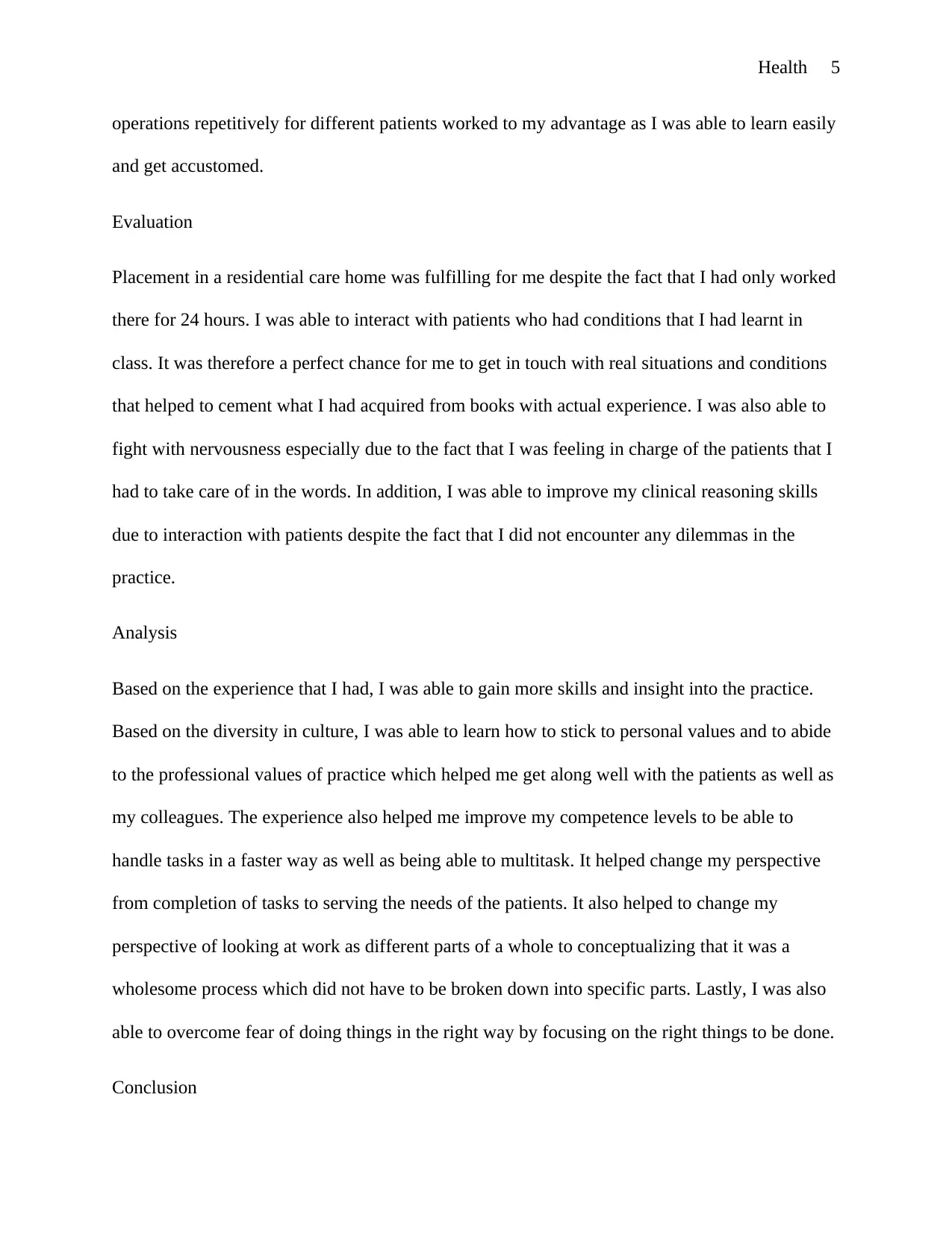
Health 5
operations repetitively for different patients worked to my advantage as I was able to learn easily
and get accustomed.
Evaluation
Placement in a residential care home was fulfilling for me despite the fact that I had only worked
there for 24 hours. I was able to interact with patients who had conditions that I had learnt in
class. It was therefore a perfect chance for me to get in touch with real situations and conditions
that helped to cement what I had acquired from books with actual experience. I was also able to
fight with nervousness especially due to the fact that I was feeling in charge of the patients that I
had to take care of in the words. In addition, I was able to improve my clinical reasoning skills
due to interaction with patients despite the fact that I did not encounter any dilemmas in the
practice.
Analysis
Based on the experience that I had, I was able to gain more skills and insight into the practice.
Based on the diversity in culture, I was able to learn how to stick to personal values and to abide
to the professional values of practice which helped me get along well with the patients as well as
my colleagues. The experience also helped me improve my competence levels to be able to
handle tasks in a faster way as well as being able to multitask. It helped change my perspective
from completion of tasks to serving the needs of the patients. It also helped to change my
perspective of looking at work as different parts of a whole to conceptualizing that it was a
wholesome process which did not have to be broken down into specific parts. Lastly, I was also
able to overcome fear of doing things in the right way by focusing on the right things to be done.
Conclusion
operations repetitively for different patients worked to my advantage as I was able to learn easily
and get accustomed.
Evaluation
Placement in a residential care home was fulfilling for me despite the fact that I had only worked
there for 24 hours. I was able to interact with patients who had conditions that I had learnt in
class. It was therefore a perfect chance for me to get in touch with real situations and conditions
that helped to cement what I had acquired from books with actual experience. I was also able to
fight with nervousness especially due to the fact that I was feeling in charge of the patients that I
had to take care of in the words. In addition, I was able to improve my clinical reasoning skills
due to interaction with patients despite the fact that I did not encounter any dilemmas in the
practice.
Analysis
Based on the experience that I had, I was able to gain more skills and insight into the practice.
Based on the diversity in culture, I was able to learn how to stick to personal values and to abide
to the professional values of practice which helped me get along well with the patients as well as
my colleagues. The experience also helped me improve my competence levels to be able to
handle tasks in a faster way as well as being able to multitask. It helped change my perspective
from completion of tasks to serving the needs of the patients. It also helped to change my
perspective of looking at work as different parts of a whole to conceptualizing that it was a
wholesome process which did not have to be broken down into specific parts. Lastly, I was also
able to overcome fear of doing things in the right way by focusing on the right things to be done.
Conclusion
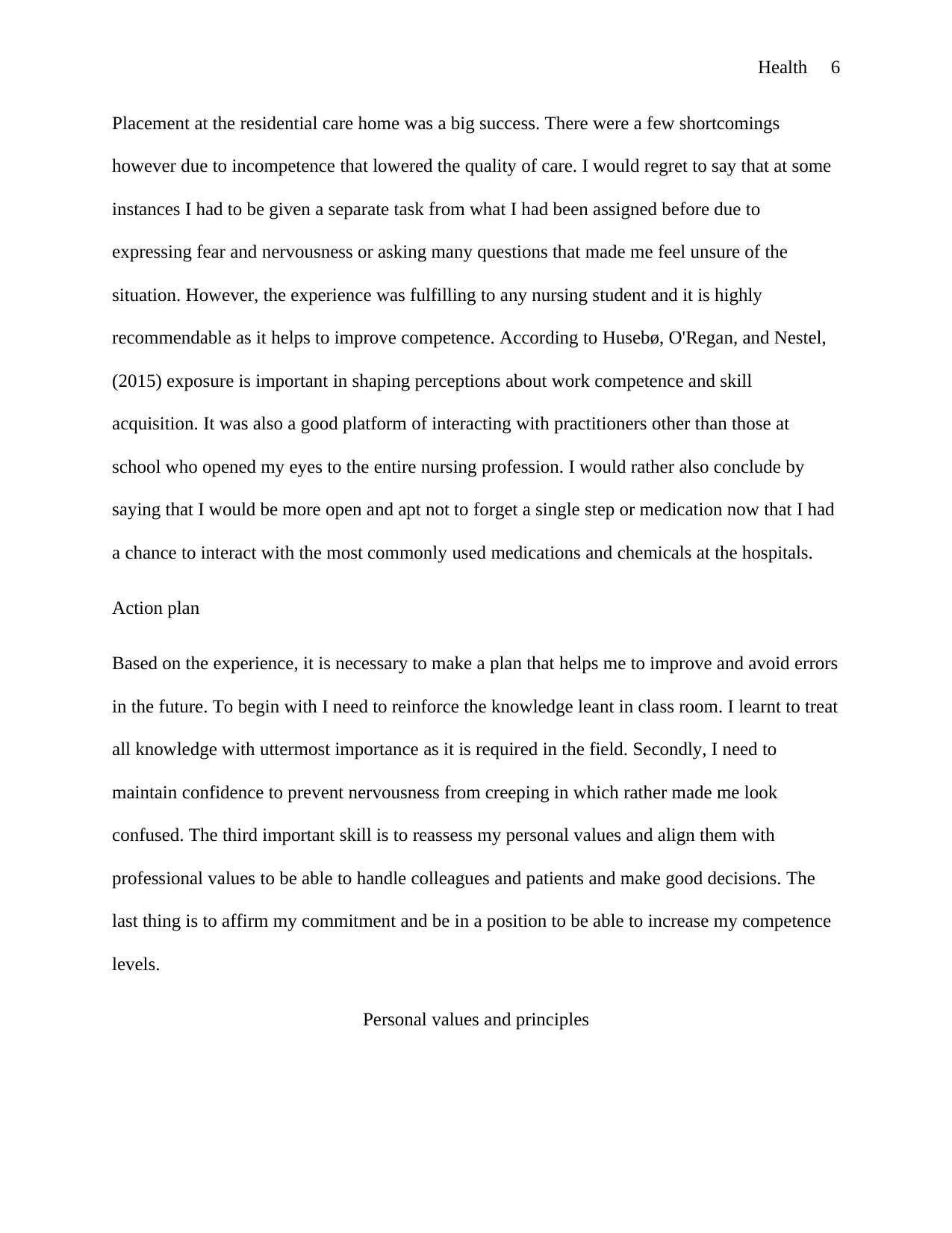
Health 6
Placement at the residential care home was a big success. There were a few shortcomings
however due to incompetence that lowered the quality of care. I would regret to say that at some
instances I had to be given a separate task from what I had been assigned before due to
expressing fear and nervousness or asking many questions that made me feel unsure of the
situation. However, the experience was fulfilling to any nursing student and it is highly
recommendable as it helps to improve competence. According to Husebø, O'Regan, and Nestel,
(2015) exposure is important in shaping perceptions about work competence and skill
acquisition. It was also a good platform of interacting with practitioners other than those at
school who opened my eyes to the entire nursing profession. I would rather also conclude by
saying that I would be more open and apt not to forget a single step or medication now that I had
a chance to interact with the most commonly used medications and chemicals at the hospitals.
Action plan
Based on the experience, it is necessary to make a plan that helps me to improve and avoid errors
in the future. To begin with I need to reinforce the knowledge leant in class room. I learnt to treat
all knowledge with uttermost importance as it is required in the field. Secondly, I need to
maintain confidence to prevent nervousness from creeping in which rather made me look
confused. The third important skill is to reassess my personal values and align them with
professional values to be able to handle colleagues and patients and make good decisions. The
last thing is to affirm my commitment and be in a position to be able to increase my competence
levels.
Personal values and principles
Placement at the residential care home was a big success. There were a few shortcomings
however due to incompetence that lowered the quality of care. I would regret to say that at some
instances I had to be given a separate task from what I had been assigned before due to
expressing fear and nervousness or asking many questions that made me feel unsure of the
situation. However, the experience was fulfilling to any nursing student and it is highly
recommendable as it helps to improve competence. According to Husebø, O'Regan, and Nestel,
(2015) exposure is important in shaping perceptions about work competence and skill
acquisition. It was also a good platform of interacting with practitioners other than those at
school who opened my eyes to the entire nursing profession. I would rather also conclude by
saying that I would be more open and apt not to forget a single step or medication now that I had
a chance to interact with the most commonly used medications and chemicals at the hospitals.
Action plan
Based on the experience, it is necessary to make a plan that helps me to improve and avoid errors
in the future. To begin with I need to reinforce the knowledge leant in class room. I learnt to treat
all knowledge with uttermost importance as it is required in the field. Secondly, I need to
maintain confidence to prevent nervousness from creeping in which rather made me look
confused. The third important skill is to reassess my personal values and align them with
professional values to be able to handle colleagues and patients and make good decisions. The
last thing is to affirm my commitment and be in a position to be able to increase my competence
levels.
Personal values and principles
⊘ This is a preview!⊘
Do you want full access?
Subscribe today to unlock all pages.

Trusted by 1+ million students worldwide
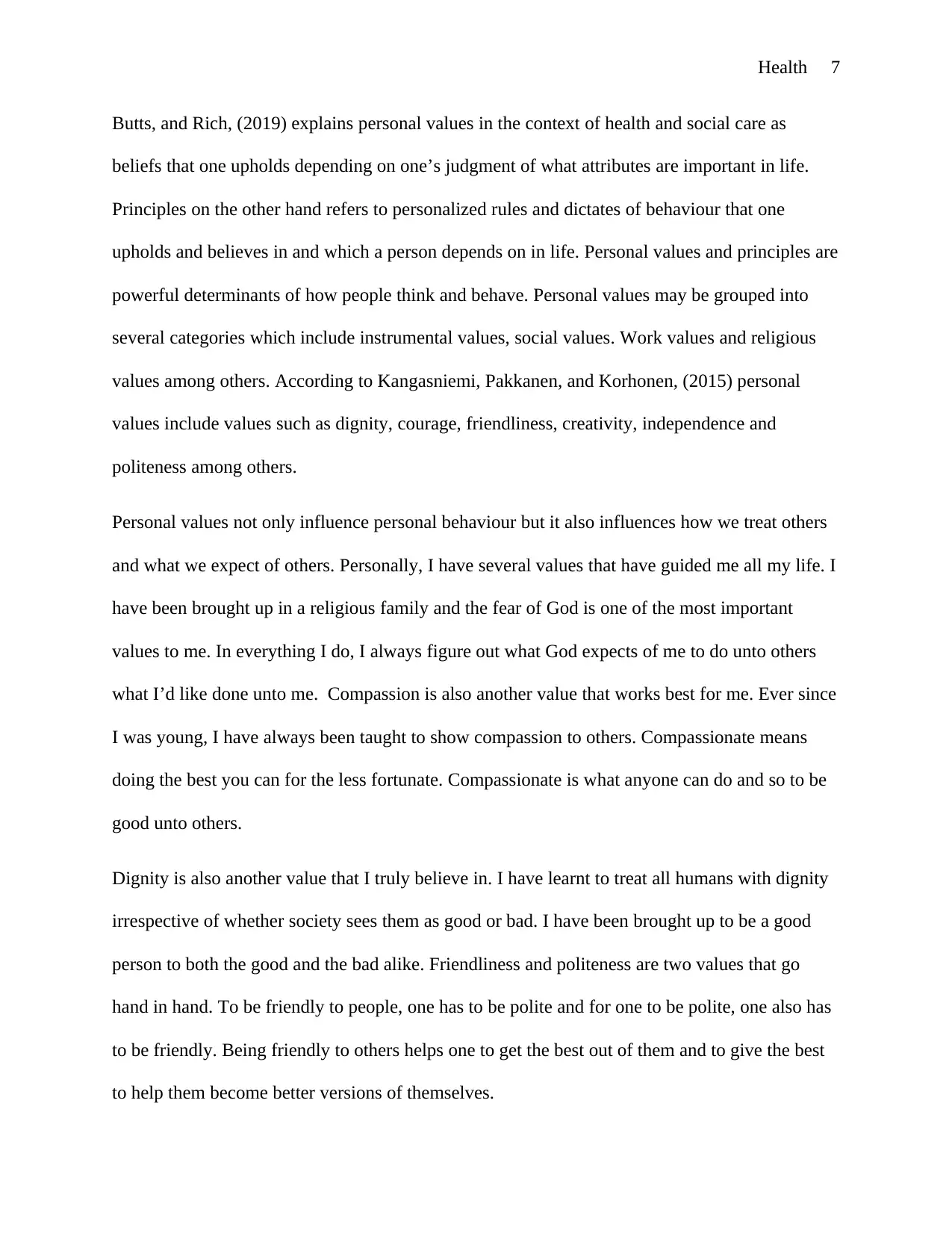
Health 7
Butts, and Rich, (2019) explains personal values in the context of health and social care as
beliefs that one upholds depending on one’s judgment of what attributes are important in life.
Principles on the other hand refers to personalized rules and dictates of behaviour that one
upholds and believes in and which a person depends on in life. Personal values and principles are
powerful determinants of how people think and behave. Personal values may be grouped into
several categories which include instrumental values, social values. Work values and religious
values among others. According to Kangasniemi, Pakkanen, and Korhonen, (2015) personal
values include values such as dignity, courage, friendliness, creativity, independence and
politeness among others.
Personal values not only influence personal behaviour but it also influences how we treat others
and what we expect of others. Personally, I have several values that have guided me all my life. I
have been brought up in a religious family and the fear of God is one of the most important
values to me. In everything I do, I always figure out what God expects of me to do unto others
what I’d like done unto me. Compassion is also another value that works best for me. Ever since
I was young, I have always been taught to show compassion to others. Compassionate means
doing the best you can for the less fortunate. Compassionate is what anyone can do and so to be
good unto others.
Dignity is also another value that I truly believe in. I have learnt to treat all humans with dignity
irrespective of whether society sees them as good or bad. I have been brought up to be a good
person to both the good and the bad alike. Friendliness and politeness are two values that go
hand in hand. To be friendly to people, one has to be polite and for one to be polite, one also has
to be friendly. Being friendly to others helps one to get the best out of them and to give the best
to help them become better versions of themselves.
Butts, and Rich, (2019) explains personal values in the context of health and social care as
beliefs that one upholds depending on one’s judgment of what attributes are important in life.
Principles on the other hand refers to personalized rules and dictates of behaviour that one
upholds and believes in and which a person depends on in life. Personal values and principles are
powerful determinants of how people think and behave. Personal values may be grouped into
several categories which include instrumental values, social values. Work values and religious
values among others. According to Kangasniemi, Pakkanen, and Korhonen, (2015) personal
values include values such as dignity, courage, friendliness, creativity, independence and
politeness among others.
Personal values not only influence personal behaviour but it also influences how we treat others
and what we expect of others. Personally, I have several values that have guided me all my life. I
have been brought up in a religious family and the fear of God is one of the most important
values to me. In everything I do, I always figure out what God expects of me to do unto others
what I’d like done unto me. Compassion is also another value that works best for me. Ever since
I was young, I have always been taught to show compassion to others. Compassionate means
doing the best you can for the less fortunate. Compassionate is what anyone can do and so to be
good unto others.
Dignity is also another value that I truly believe in. I have learnt to treat all humans with dignity
irrespective of whether society sees them as good or bad. I have been brought up to be a good
person to both the good and the bad alike. Friendliness and politeness are two values that go
hand in hand. To be friendly to people, one has to be polite and for one to be polite, one also has
to be friendly. Being friendly to others helps one to get the best out of them and to give the best
to help them become better versions of themselves.
Paraphrase This Document
Need a fresh take? Get an instant paraphrase of this document with our AI Paraphraser
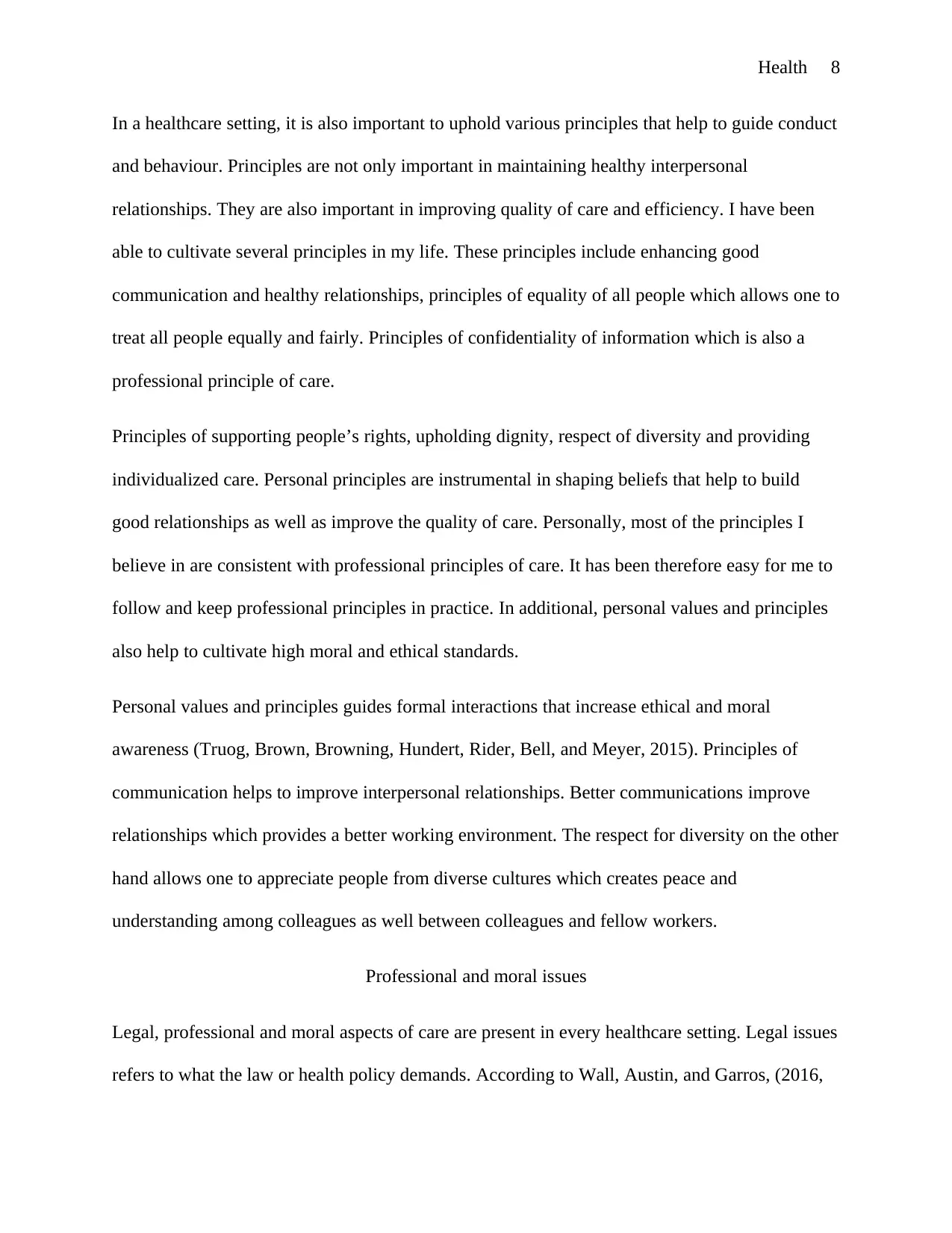
Health 8
In a healthcare setting, it is also important to uphold various principles that help to guide conduct
and behaviour. Principles are not only important in maintaining healthy interpersonal
relationships. They are also important in improving quality of care and efficiency. I have been
able to cultivate several principles in my life. These principles include enhancing good
communication and healthy relationships, principles of equality of all people which allows one to
treat all people equally and fairly. Principles of confidentiality of information which is also a
professional principle of care.
Principles of supporting people’s rights, upholding dignity, respect of diversity and providing
individualized care. Personal principles are instrumental in shaping beliefs that help to build
good relationships as well as improve the quality of care. Personally, most of the principles I
believe in are consistent with professional principles of care. It has been therefore easy for me to
follow and keep professional principles in practice. In additional, personal values and principles
also help to cultivate high moral and ethical standards.
Personal values and principles guides formal interactions that increase ethical and moral
awareness (Truog, Brown, Browning, Hundert, Rider, Bell, and Meyer, 2015). Principles of
communication helps to improve interpersonal relationships. Better communications improve
relationships which provides a better working environment. The respect for diversity on the other
hand allows one to appreciate people from diverse cultures which creates peace and
understanding among colleagues as well between colleagues and fellow workers.
Professional and moral issues
Legal, professional and moral aspects of care are present in every healthcare setting. Legal issues
refers to what the law or health policy demands. According to Wall, Austin, and Garros, (2016,
In a healthcare setting, it is also important to uphold various principles that help to guide conduct
and behaviour. Principles are not only important in maintaining healthy interpersonal
relationships. They are also important in improving quality of care and efficiency. I have been
able to cultivate several principles in my life. These principles include enhancing good
communication and healthy relationships, principles of equality of all people which allows one to
treat all people equally and fairly. Principles of confidentiality of information which is also a
professional principle of care.
Principles of supporting people’s rights, upholding dignity, respect of diversity and providing
individualized care. Personal principles are instrumental in shaping beliefs that help to build
good relationships as well as improve the quality of care. Personally, most of the principles I
believe in are consistent with professional principles of care. It has been therefore easy for me to
follow and keep professional principles in practice. In additional, personal values and principles
also help to cultivate high moral and ethical standards.
Personal values and principles guides formal interactions that increase ethical and moral
awareness (Truog, Brown, Browning, Hundert, Rider, Bell, and Meyer, 2015). Principles of
communication helps to improve interpersonal relationships. Better communications improve
relationships which provides a better working environment. The respect for diversity on the other
hand allows one to appreciate people from diverse cultures which creates peace and
understanding among colleagues as well between colleagues and fellow workers.
Professional and moral issues
Legal, professional and moral aspects of care are present in every healthcare setting. Legal issues
refers to what the law or health policy demands. According to Wall, Austin, and Garros, (2016,
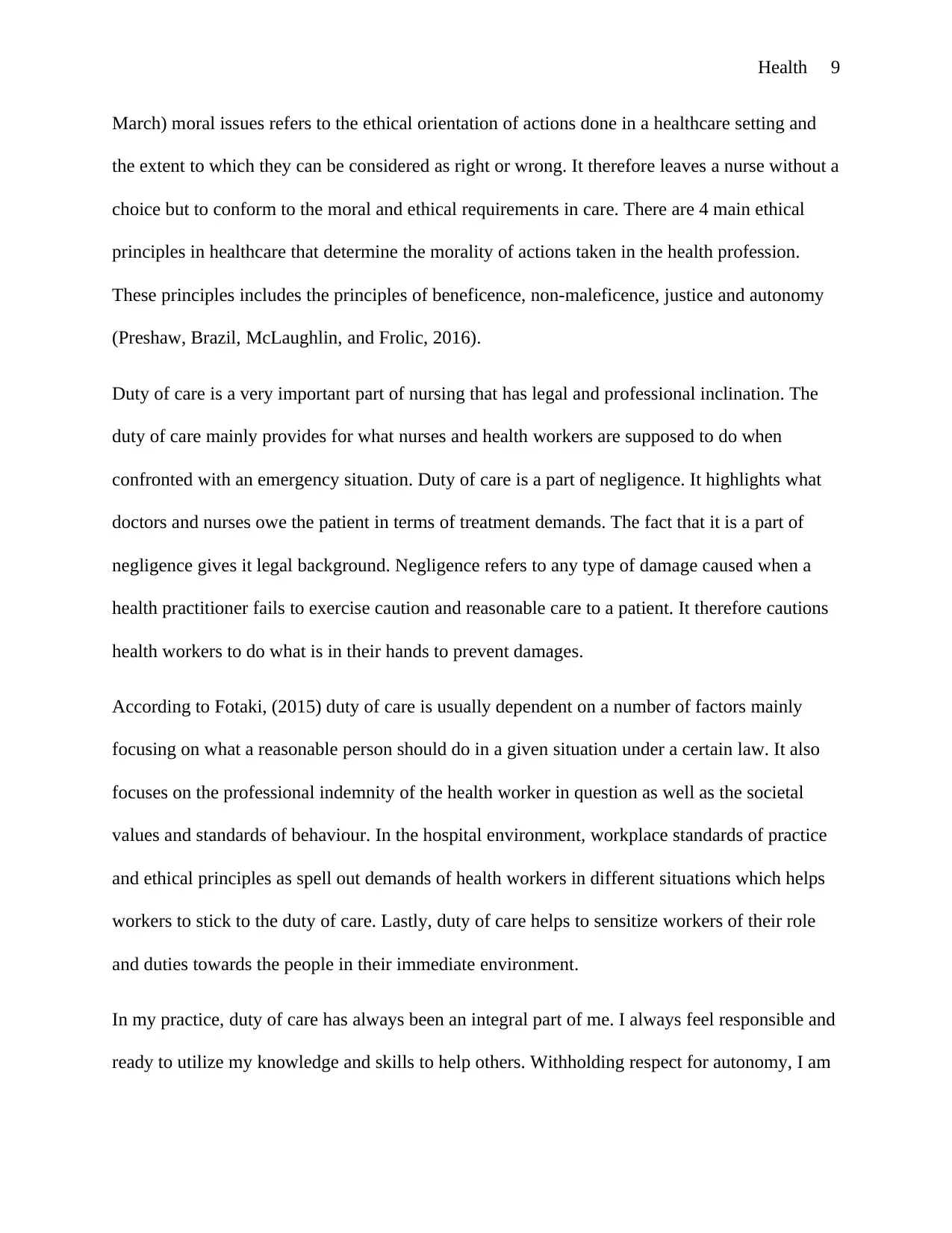
Health 9
March) moral issues refers to the ethical orientation of actions done in a healthcare setting and
the extent to which they can be considered as right or wrong. It therefore leaves a nurse without a
choice but to conform to the moral and ethical requirements in care. There are 4 main ethical
principles in healthcare that determine the morality of actions taken in the health profession.
These principles includes the principles of beneficence, non-maleficence, justice and autonomy
(Preshaw, Brazil, McLaughlin, and Frolic, 2016).
Duty of care is a very important part of nursing that has legal and professional inclination. The
duty of care mainly provides for what nurses and health workers are supposed to do when
confronted with an emergency situation. Duty of care is a part of negligence. It highlights what
doctors and nurses owe the patient in terms of treatment demands. The fact that it is a part of
negligence gives it legal background. Negligence refers to any type of damage caused when a
health practitioner fails to exercise caution and reasonable care to a patient. It therefore cautions
health workers to do what is in their hands to prevent damages.
According to Fotaki, (2015) duty of care is usually dependent on a number of factors mainly
focusing on what a reasonable person should do in a given situation under a certain law. It also
focuses on the professional indemnity of the health worker in question as well as the societal
values and standards of behaviour. In the hospital environment, workplace standards of practice
and ethical principles as spell out demands of health workers in different situations which helps
workers to stick to the duty of care. Lastly, duty of care helps to sensitize workers of their role
and duties towards the people in their immediate environment.
In my practice, duty of care has always been an integral part of me. I always feel responsible and
ready to utilize my knowledge and skills to help others. Withholding respect for autonomy, I am
March) moral issues refers to the ethical orientation of actions done in a healthcare setting and
the extent to which they can be considered as right or wrong. It therefore leaves a nurse without a
choice but to conform to the moral and ethical requirements in care. There are 4 main ethical
principles in healthcare that determine the morality of actions taken in the health profession.
These principles includes the principles of beneficence, non-maleficence, justice and autonomy
(Preshaw, Brazil, McLaughlin, and Frolic, 2016).
Duty of care is a very important part of nursing that has legal and professional inclination. The
duty of care mainly provides for what nurses and health workers are supposed to do when
confronted with an emergency situation. Duty of care is a part of negligence. It highlights what
doctors and nurses owe the patient in terms of treatment demands. The fact that it is a part of
negligence gives it legal background. Negligence refers to any type of damage caused when a
health practitioner fails to exercise caution and reasonable care to a patient. It therefore cautions
health workers to do what is in their hands to prevent damages.
According to Fotaki, (2015) duty of care is usually dependent on a number of factors mainly
focusing on what a reasonable person should do in a given situation under a certain law. It also
focuses on the professional indemnity of the health worker in question as well as the societal
values and standards of behaviour. In the hospital environment, workplace standards of practice
and ethical principles as spell out demands of health workers in different situations which helps
workers to stick to the duty of care. Lastly, duty of care helps to sensitize workers of their role
and duties towards the people in their immediate environment.
In my practice, duty of care has always been an integral part of me. I always feel responsible and
ready to utilize my knowledge and skills to help others. Withholding respect for autonomy, I am
⊘ This is a preview!⊘
Do you want full access?
Subscribe today to unlock all pages.

Trusted by 1+ million students worldwide
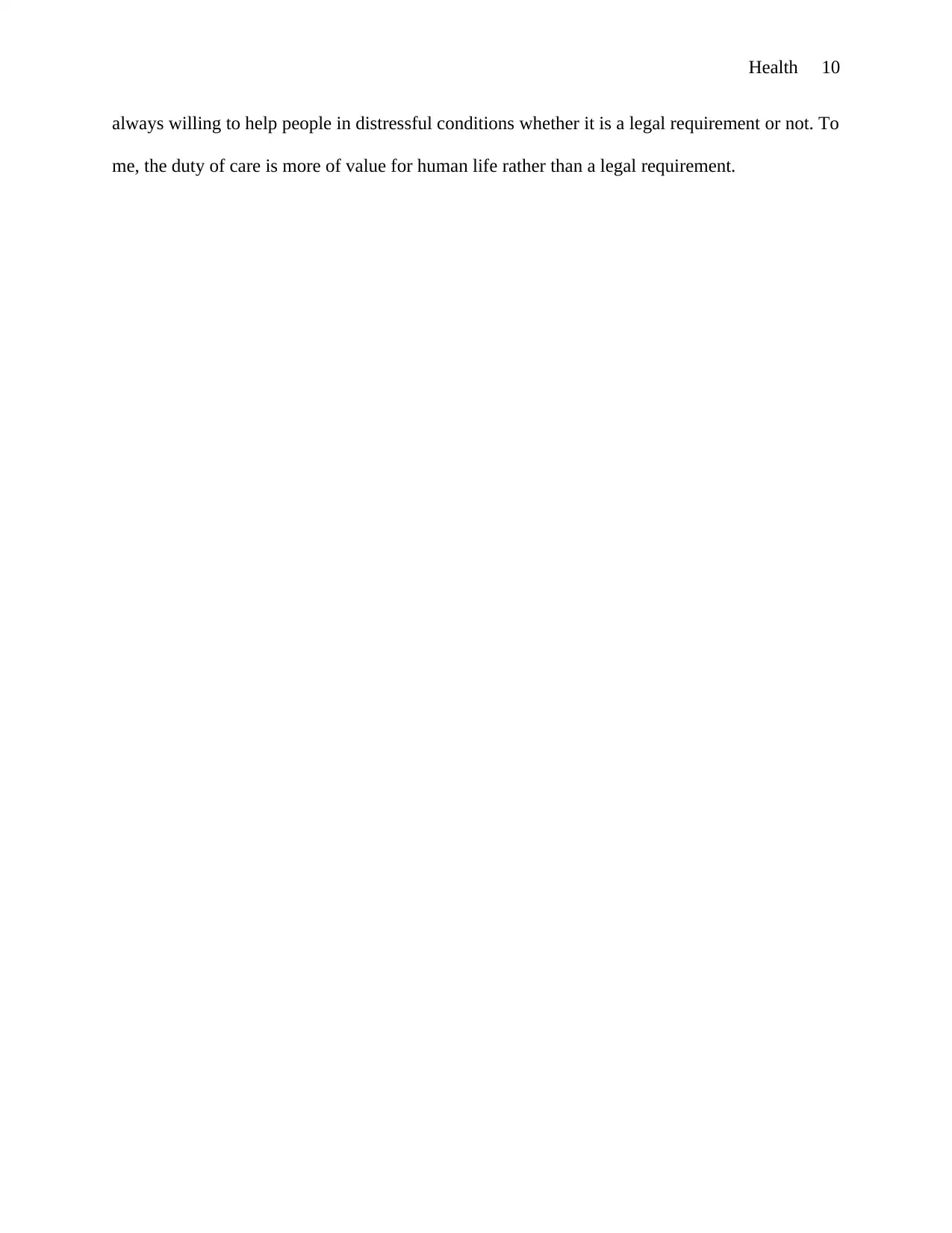
Health 10
always willing to help people in distressful conditions whether it is a legal requirement or not. To
me, the duty of care is more of value for human life rather than a legal requirement.
always willing to help people in distressful conditions whether it is a legal requirement or not. To
me, the duty of care is more of value for human life rather than a legal requirement.
Paraphrase This Document
Need a fresh take? Get an instant paraphrase of this document with our AI Paraphraser
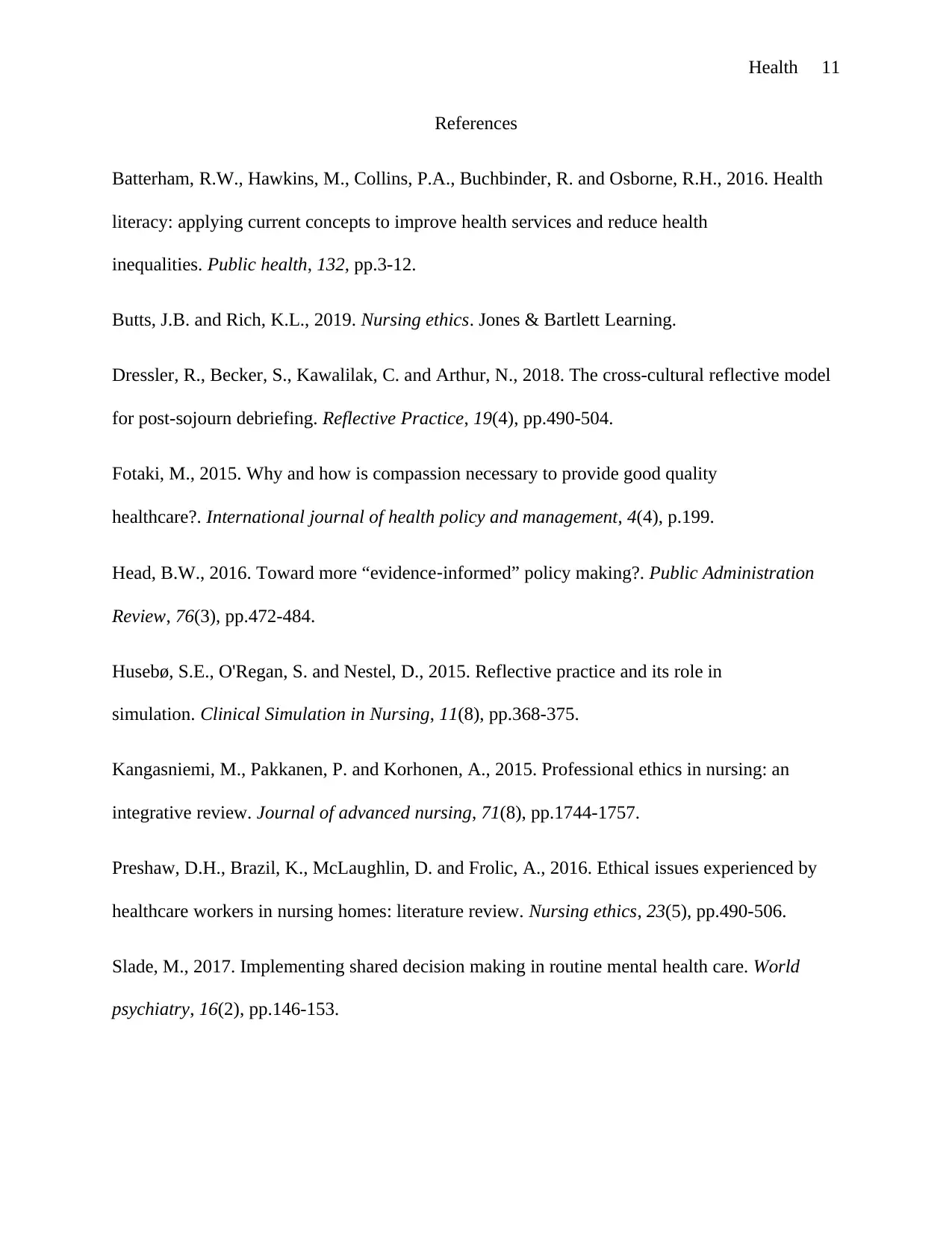
Health 11
References
Batterham, R.W., Hawkins, M., Collins, P.A., Buchbinder, R. and Osborne, R.H., 2016. Health
literacy: applying current concepts to improve health services and reduce health
inequalities. Public health, 132, pp.3-12.
Butts, J.B. and Rich, K.L., 2019. Nursing ethics. Jones & Bartlett Learning.
Dressler, R., Becker, S., Kawalilak, C. and Arthur, N., 2018. The cross-cultural reflective model
for post-sojourn debriefing. Reflective Practice, 19(4), pp.490-504.
Fotaki, M., 2015. Why and how is compassion necessary to provide good quality
healthcare?. International journal of health policy and management, 4(4), p.199.
Head, B.W., 2016. Toward more “evidence‐informed” policy making?. Public Administration
Review, 76(3), pp.472-484.
Husebø, S.E., O'Regan, S. and Nestel, D., 2015. Reflective practice and its role in
simulation. Clinical Simulation in Nursing, 11(8), pp.368-375.
Kangasniemi, M., Pakkanen, P. and Korhonen, A., 2015. Professional ethics in nursing: an
integrative review. Journal of advanced nursing, 71(8), pp.1744-1757.
Preshaw, D.H., Brazil, K., McLaughlin, D. and Frolic, A., 2016. Ethical issues experienced by
healthcare workers in nursing homes: literature review. Nursing ethics, 23(5), pp.490-506.
Slade, M., 2017. Implementing shared decision making in routine mental health care. World
psychiatry, 16(2), pp.146-153.
References
Batterham, R.W., Hawkins, M., Collins, P.A., Buchbinder, R. and Osborne, R.H., 2016. Health
literacy: applying current concepts to improve health services and reduce health
inequalities. Public health, 132, pp.3-12.
Butts, J.B. and Rich, K.L., 2019. Nursing ethics. Jones & Bartlett Learning.
Dressler, R., Becker, S., Kawalilak, C. and Arthur, N., 2018. The cross-cultural reflective model
for post-sojourn debriefing. Reflective Practice, 19(4), pp.490-504.
Fotaki, M., 2015. Why and how is compassion necessary to provide good quality
healthcare?. International journal of health policy and management, 4(4), p.199.
Head, B.W., 2016. Toward more “evidence‐informed” policy making?. Public Administration
Review, 76(3), pp.472-484.
Husebø, S.E., O'Regan, S. and Nestel, D., 2015. Reflective practice and its role in
simulation. Clinical Simulation in Nursing, 11(8), pp.368-375.
Kangasniemi, M., Pakkanen, P. and Korhonen, A., 2015. Professional ethics in nursing: an
integrative review. Journal of advanced nursing, 71(8), pp.1744-1757.
Preshaw, D.H., Brazil, K., McLaughlin, D. and Frolic, A., 2016. Ethical issues experienced by
healthcare workers in nursing homes: literature review. Nursing ethics, 23(5), pp.490-506.
Slade, M., 2017. Implementing shared decision making in routine mental health care. World
psychiatry, 16(2), pp.146-153.
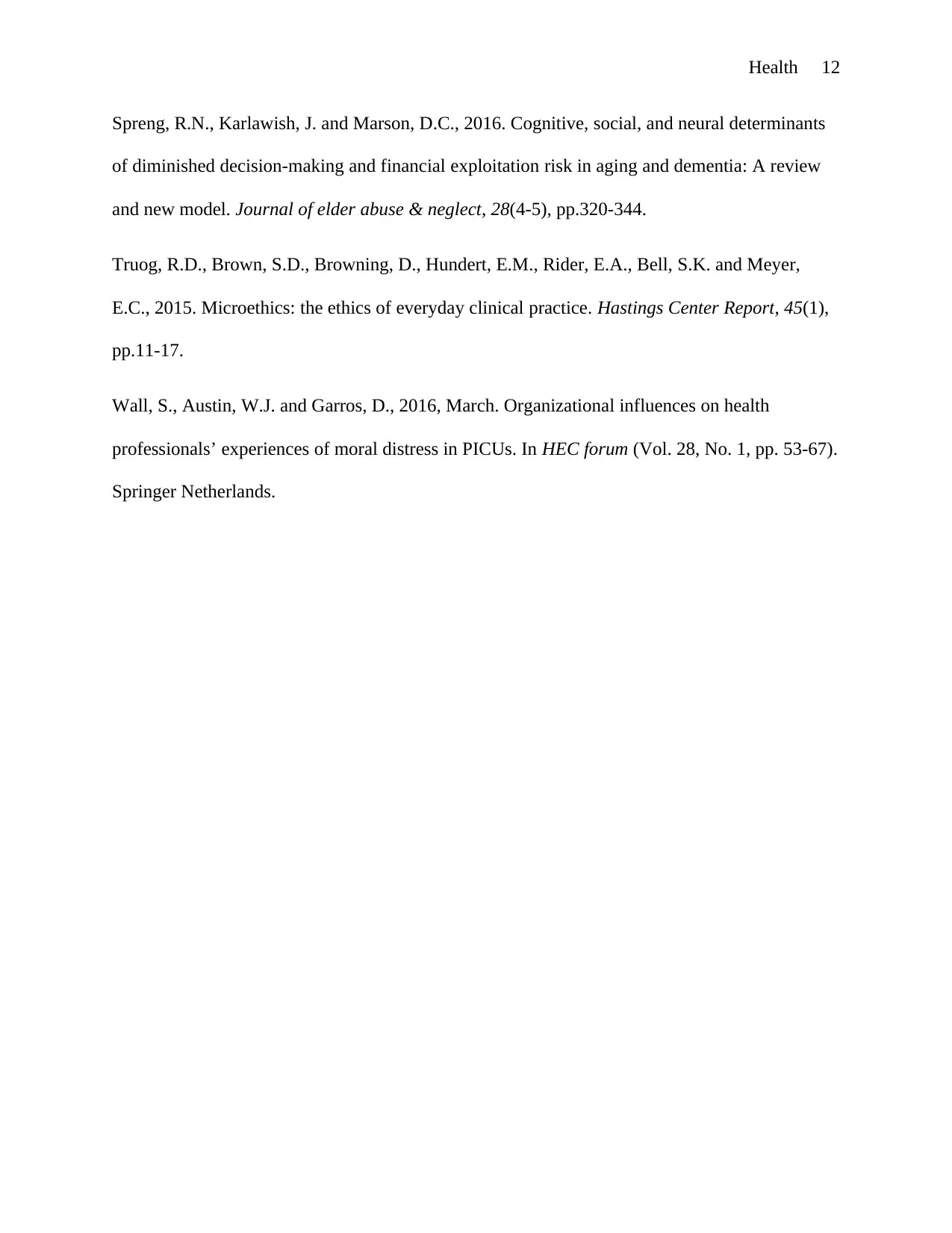
Health 12
Spreng, R.N., Karlawish, J. and Marson, D.C., 2016. Cognitive, social, and neural determinants
of diminished decision-making and financial exploitation risk in aging and dementia: A review
and new model. Journal of elder abuse & neglect, 28(4-5), pp.320-344.
Truog, R.D., Brown, S.D., Browning, D., Hundert, E.M., Rider, E.A., Bell, S.K. and Meyer,
E.C., 2015. Microethics: the ethics of everyday clinical practice. Hastings Center Report, 45(1),
pp.11-17.
Wall, S., Austin, W.J. and Garros, D., 2016, March. Organizational influences on health
professionals’ experiences of moral distress in PICUs. In HEC forum (Vol. 28, No. 1, pp. 53-67).
Springer Netherlands.
Spreng, R.N., Karlawish, J. and Marson, D.C., 2016. Cognitive, social, and neural determinants
of diminished decision-making and financial exploitation risk in aging and dementia: A review
and new model. Journal of elder abuse & neglect, 28(4-5), pp.320-344.
Truog, R.D., Brown, S.D., Browning, D., Hundert, E.M., Rider, E.A., Bell, S.K. and Meyer,
E.C., 2015. Microethics: the ethics of everyday clinical practice. Hastings Center Report, 45(1),
pp.11-17.
Wall, S., Austin, W.J. and Garros, D., 2016, March. Organizational influences on health
professionals’ experiences of moral distress in PICUs. In HEC forum (Vol. 28, No. 1, pp. 53-67).
Springer Netherlands.
⊘ This is a preview!⊘
Do you want full access?
Subscribe today to unlock all pages.

Trusted by 1+ million students worldwide
1 out of 12
Related Documents
Your All-in-One AI-Powered Toolkit for Academic Success.
+13062052269
info@desklib.com
Available 24*7 on WhatsApp / Email
![[object Object]](/_next/static/media/star-bottom.7253800d.svg)
Unlock your academic potential
Copyright © 2020–2025 A2Z Services. All Rights Reserved. Developed and managed by ZUCOL.





